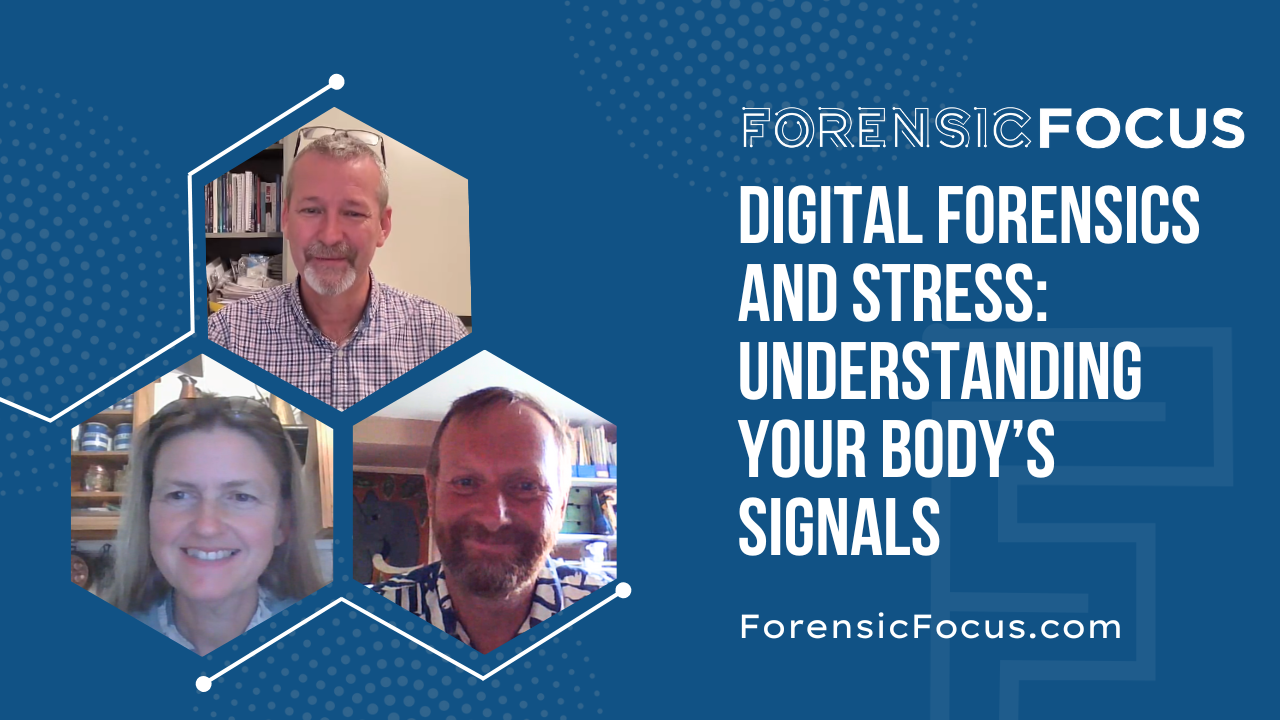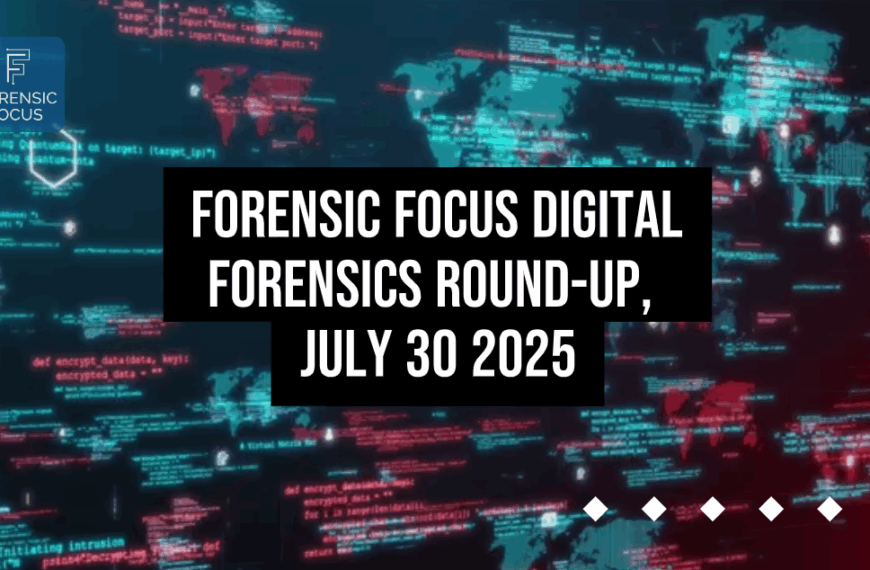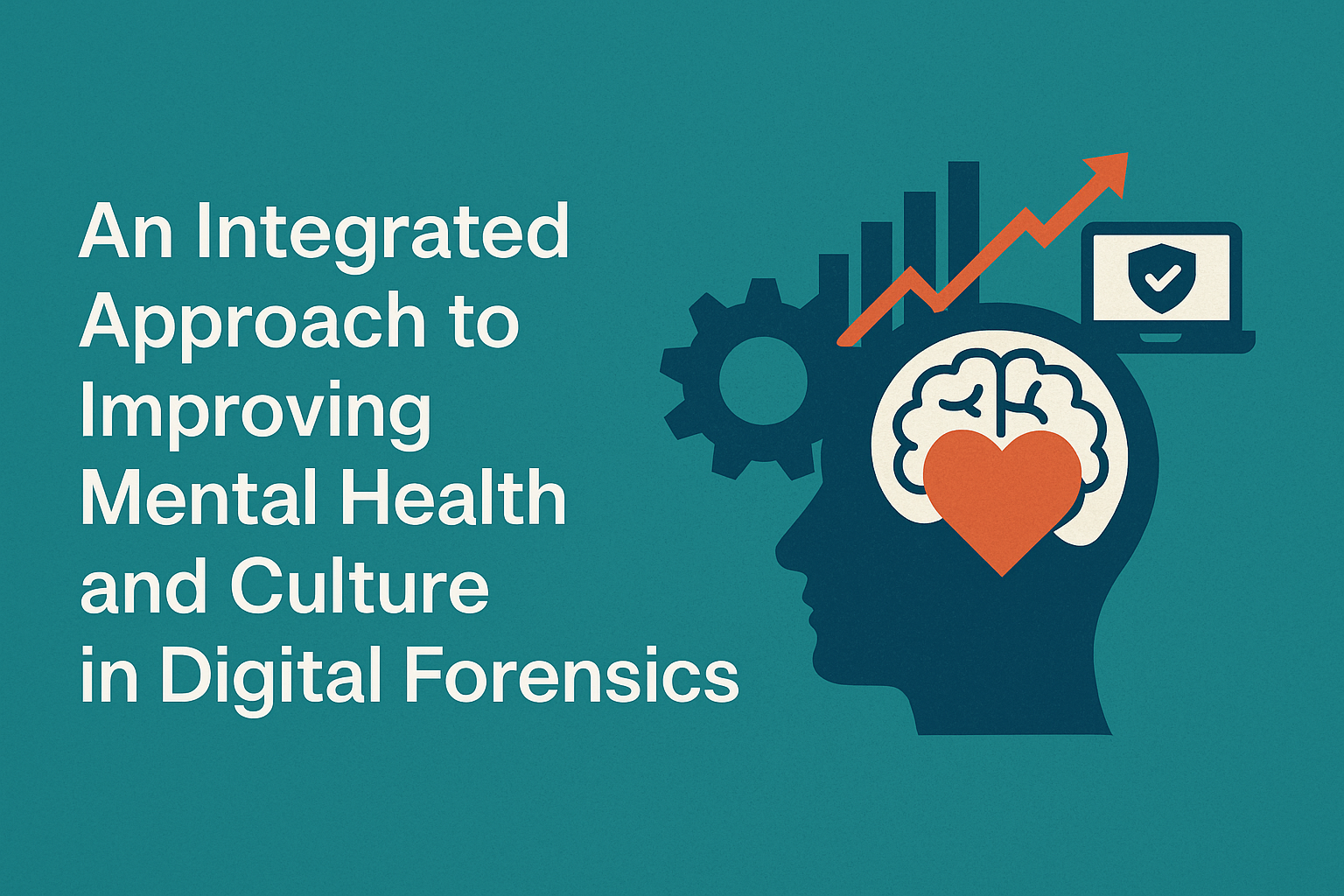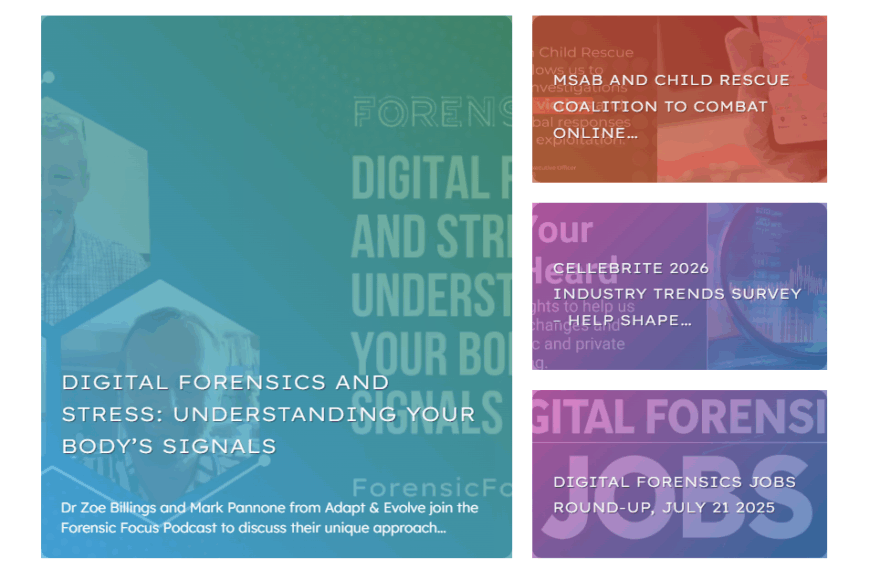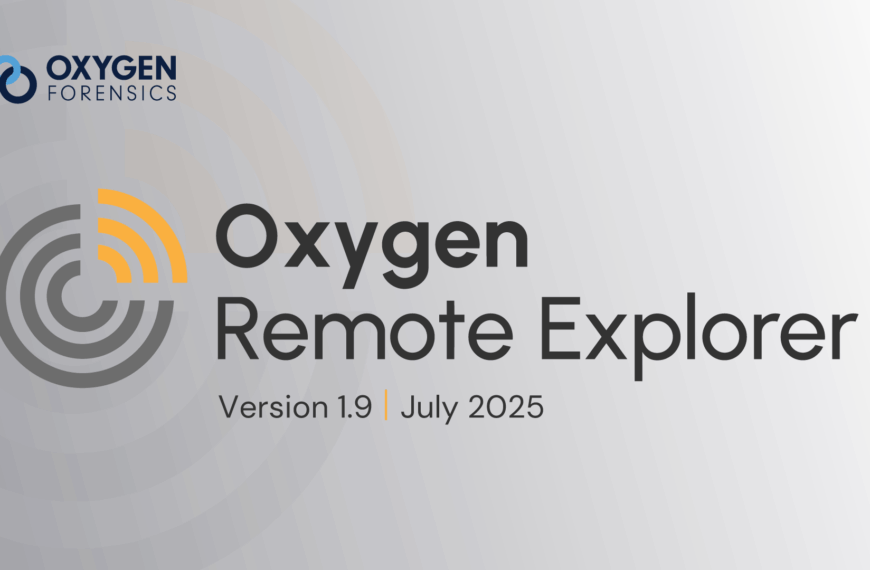The following transcript was generated by AI and may contain inaccuracies.
Paul: Welcome to Forensic Focus, the podcast where we explore the critical issues shaping the world of digital forensics and those who work within it. I am your host, Paul Golden, and in today’s episode, we are going to shine a spotlight on the growing area of concern in our profession: mental health and wellbeing.
Those of us who spent time working in digital forensics understand the toll this work can take. Exposure to traumatic material, high case loads, relentless deadlines, and the weight of responsibility all contribute to chronic stress, burnout, and sometimes long-term psychological harm. In this episode, we’ll be exploring an innovative way to address those challenges head on.
Joining me are two exceptional guests, Dr. Zoe Billings and Mark Pannone. Co-founders of Adapt & Evolve with unique and complementary backgrounds. Zoe, as a biologist and former senior investigator in road traffic fatalities, and Mark as a former assistant Chief Constable, strategic commander and crisis negotiator.
They have combined decades of frontline and leadership experience to create a service dedicated to enhancing resilience, performance and wellbeing in high pressure professions. Together we’ll discuss the origins of Adapt & Evolve, their approach to stress, decision making and team performance, and why services like this could be vital to supporting the long-term mental health of digital forensic investigators.
This is more than a conversation about coping. It’s a conversation about evolving and adapting and finding sustainable ways to thrive in one of the most psychologically demanding roles in law enforcement. Welcome to the podcast Zoe and Mark. We’re really pleased to have you here.
Mark: Thank you. Hi.
Paul: Hi, Paul. Thank you for having us. Thanks for joining. Zoe, would you like to begin?
Zoe: Yes. So Mark, in 2019, I noticed in North Yorkshire Police where I was working that we’d got a reasonably sized occupational health department. There was a lot of work going on there to reduce stress and look after people.
But despite their best efforts, we still had people off on long-term sick. We had performance issues and some retention issues in certain areas. My background, as you said, doctor of biology – did my PhD at the University of York and I’ve tutored A-level for over 25 years.
I looked at the wellbeing provision and it focused solely around the mental health aspect, which was great – there was provision for it. But I equate it that if you teach people to recognize there’s something wrong when they recognize it as a mental health concern, you’re effectively teaching them to recognize that there’s a problem with their car when the engine seizes. And that’s too far down the line.
By that time, you’ve got to go off work, you’ve got to get your car towed, that sort of thing. I look at the biological aspects of stress because stress starts to manifest itself in the body physically whilst your brain is still saying, “I’m fine,” and it’s still pretending to carry on because from an evolutionary perspective, that’s what we’re programmed to do.
It’s not our fault – that’s hardwired in. So by looking at the biological aspects of stress, that’s the biological version of teaching you what the dashboard warning lights on your car mean. So when they come on, you can take action, get it resolved, and then your car keeps working and you keep going, and hopefully you’d never get to that point where your engine seizes.
So the biological aspects of stress – the biological wellbeing that we deliver – is effectively early intervention and prevention for stress. It stops people hopefully getting to the point where they are affected by the mental health aspects of stress, by teaching them to recognize it at the earliest opportunity, and really crucially how to then mitigate it and how to deal with it with a really comprehensive toolkit.
Paul: I think you’ve beautifully put together something here, which I quite often talk about and which I’ve talked about in the past, and that’s approaching this from a preventative point of view as opposed to a reactive point of view. You obviously identified within your force that there was no psychoeducation, for example, around the stresses that you could become susceptible to. And that’s where you come from.
Zoe: Absolutely. And I was brave slash daring enough to deliver it to our occupational health department. That could have gone one or two ways, but they took it really well. And there was that sort of recognition and that light bulb moment for them that we’ve never thought about it that way. So it got their endorsement and then the assistant chief constable saw it, which Mark could probably fill you in on what they thought.
Paul: So what did the assistant chief think, Mark?
Mark: I joined North Yorkshire Police during COVID. And it was then that I met Zoe – had the pleasure of meeting Zoe. And I was so impressed with it that I actually mandated it for those departments that were really struggling with stress that I was responsible for.
So the digital forensics unit was one of those departments. They were going through the UKAS accreditation challenges at the time, and we had a high sickness challenge within that department. DFU was one – some of the departments that were quite highly stressed, high sickness, not great performance necessarily – got them to listen to Zoe, mandated them to hear what she had to say about how to identify stress within yourself.
On the back of that I saw an improvement in both the performance and also the approach – the sort of like the feel, the culture within those teams and the self support that then went on and the self challenge within those individuals was fantastic. Because they were talking now a new language of prevention, like you say Paul, rather than individuals who, when they go pop, having to leave the organization, leave the department and deal with the unnecessary harms that could have been prevented with a more improved, resilient-based approach, a trauma informed approach.
So basically I loved what Zoe did. And then on the back of that, when I retired I then started working with Zoe. And now we go around the world. We’ve worked with the FBI – obviously we went out with yourself, Paul, in Munich last month and work with organizations throughout the UK teaching them how to identify stress within themselves.
How teams can then work to support each other. And then importantly, identify what the problems are within an organization that’s actually stopping you from thriving as an employee and how you can help yourself and your family. As importantly, look after each other, monitor each other and check each other out to make sure that things are on an even keel. And if they’re not, giving them tools, techniques, tricks to actually keep themselves in that good place rather than dealing with the adverse effects of poor decision making and poor stress management if they didn’t know this language. It really works and that’s why I’m really passionate about it.
Paul: You’ve touched on a couple of things there, Mark, which I’d like to expand on. Firstly, as a senior leader, you saw the problem.
Mark: I did. And I think the problem is with police leadership – you get to a chief officer rank, senior officer, superintendent and above, and then chief officer. You are under a lot of performance pressures. You either impose those pressures as a senior leader on others, and you’re also subject to them yourself, wherever they come from – a police and crime commissioner, from government, from your own chief constable, whatever. And that is stressful. That is difficult for anyone.
But we put no effort in teaching people how to be resilient, how to look after themselves, how to identify if things are going wrong. And it’s virtually criminally negligent, I think, that as an organization like the police, that puts people into very difficult situations, which are very hard to deal with by anyone’s standards, and not really giving people the tools on how to manage themselves both psychologically and physically.
Then it’s a case of – why do we do this? If you’re lucky, you will survive and get to the end of your career and you’ll take a pension and you’ll say “Thank God for that, I managed to escape.” Other people aren’t so lucky, and there were many people who could have continued with really impressive careers without going pop if they’d had the tools to manage themselves. And it’s those tools that we provide people with so that they can be really the best performing and most resilient that they can be. Because unfortunately, that’s what is not currently taught within policing or many other organizations I’ve seen. And that’s the gap that we hopefully fill.
Paul: I have to say as a senior leader, having spoken to many DFI around the country, do you know how rare you are?
Mark: I think the problem is that digital forensic investigators have a niche role that no one really understands. And as a leader, you want to pretend you understand everything. But because it’s such a specialist area, it’s “oh God, I really don’t understand that. I know they do great stuff and they solve loads of problems for us. But ’cause I don’t really understand it, I don’t really understand what UKAS do and I don’t really understand the ISO – I’ll just crack on and speak to the boss and hopefully everything’s going fine.”
The trouble is that digital forensic investigators are a certain type of person. There are some amazing approaches that digital forensic investigators take. And there’s a mindset and there’s a culture within DFI. The trouble is there are some problems that I have seen consistently across different digital forensic units.
And sometimes it’s about people feeling that they’ve got a voice. And I think one of the most stressful things for a lot of digital forensic investigators may not actually be the material they’re looking at – it may be – but it may actually be the fact that they feel that they don’t have a voice, they are not listened to. They’re not necessarily seen as part of the investigative framework team – part of the team.
And quite often we’ve seen this ourselves – the frustration caused by not even being notified of results in court that they were absolutely key in and pivotal in getting. That’s very stressful and it makes people feel not as valued, not having as much worth as maybe they should have. So I think we really need to recognize the type of people that work in DFI and what drives them, what motivates them and what they need.
And that’s why we go into some detail trying to really analyze what it is that the stresses are for them. And not make assumptions about what’s stressing people out, but by giving people the tools to be able to articulate, “oh, that thing is, yeah, that and that” – is it about the workplace? Is it about the kit and technology? Is it about the people you’re working with? Digging into it further, we can really help them articulate what actually is causing them problems and helping them on that journey, and then help them to address those stresses themselves.
Paul: I completely agree. It’s not just one thing that stresses DFI out. It’s not just the traumatic material. You’ve got organizational pressures, you’ve got deadlines to meet, you’ve got pressures coming in from the CPS and it all adds up. It all has a massive effect on the mental health and wellbeing of DFI who are out there at the coal face. So let’s talk about – can we talk about the proactive approach that you guys use to try and lessen the effect of the stresses borne by DFI?
Zoe: So if I kick off Mark with a bit about more about the biological wellbeing – DFI, police as a whole, law enforcement as a whole, we deal with facts and DFI very much so deal with facts, hard, cold evidence, et cetera. And so when we focus on the physical aspects of stress and say actually what actually is happening in your body and the science behind that, the evidence for that, it is an approach that really resonates with them.
Biologically our autonomic nervous system – we share that in the same pathways with all of the mammals. We share it with the birds, and we have the same pathways that the dinosaurs had, and yet we are the only species that will have stress as a comorbidity factor, because we are the only species that has that problem. And yet it’s just the same pathway as every other species.
So it’s a case of, okay, why – what’s making us different to everybody else? It’s that we use that pathway differently. We explain to them and it’s done in a really fun way. You don’t need any science behind it. It’s translated itself across, as Mark said, when we worked with the FBI, all the jokes, et cetera. It was brilliant. But yeah, and it’s a fun, engaging way of communicating the effects of cortisol, the stress hormone on the five whole body systems.
So we cover the musculoskeletal system. We cover the cardiovascular system, the gastrointestinal system, immunological system, and then fertility and sexual function and all of this – the early warning signs, the sort of dashboard lights that the body will put on in those systems that people will sit there and you can see it in their faces and they’ll be like, “I’ve got that, I’ve got that, I’ve got that.” And it’s about joining those dots up.
And once they’ve understood the science behind it, they’ve understood why their body is behaving in the way it is and why it’s not performing like it should do, and why they’re suddenly intolerant to foods that previously they’ve enjoyed, but suddenly onions are giving them gastric challenges, but they don’t understand why. And when you’ve given them the power to understand actually – yeah, okay, that’s why it’s happening – and the ability to identify that.
And then as Mark leads with the toolkit of 18 or 19 now, scientifically proven techniques that cost nothing that everybody can do to reduce their cortisol levels, to address their stress and resolve those symptoms and the impact of it. The feedback from it is incredible and the change that it makes to people is incredible. Over 3000 people have experienced this workshop so far.
And in one of our early workshops, we worked with a CEO as a quick example – medicated for high blood pressure and we teach the cardiovascular system. We teach what high blood pressure is, why stress gives you high blood pressure, what cortisol is trying to do when it increases your blood pressure, but then scientifically proven ways to reduce it.
Now three to four months after experiencing our workshop and committing to doing the activity that we’d said daily, just five minutes at a time, that’s scientifically proven to reduce blood pressure, that CEO had a medication review at the GP and was taken off their blood pressure medication.
Paul: That’s amazing.
Zoe: And that’s – yeah. When you understand exactly what high blood pressure is, how it leads to cardiovascular disease, how it will kill you, it will ruin your life, it’ll curtail your life. And in fact, they updated me last week in an email just talking about something else and said, “oh, by the way, this is over two years on now. Just had a blood pressure review at the GP and it was perfect.” And that’s medication free.
We live in a society, I think, very much in the western world where we’ve got that learned helplessness, where we have to have a tablet to fix something. You don’t. And actually, if you can remove a symptom entirely from your body rather than trying to treat it while it’s there, just by increasing your knowledge and then understanding and proactively encompassing scientifically proven things into your life to make yourself healthier and better able to perform without any medication, then that’s brilliant.
There is a place, I will just say, there is a place for medication and I would never encourage anybody to come off medication. That’s for their GP to review. But if you put yourself into a position where you don’t need it, that’s gotta be a good thing.
Paul: It absolutely has. You guys come at this from what I think is a really unique angle because we know the stressors that DFI can succumb to and the mental health effects. What there isn’t out there is a big block of research, which says, as a result of those mental health stressors, these physical ailments can come from them. And that’s where you guys come in. You guys have identified the fact that because of these stresses, DFI and others in high stress professions can then become physically ill, not just mentally ill, but physically unwell. Do you want to talk about the physical ailments that can come from this?
Zoe: Certainly. When we look at the musculoskeletal system, tension headaches, which people would expect, increased risk of migraines, neck pain, shoulder pain, but the one that people don’t understand – lower back pain. Cortisol causes your muscles to be held in tension. Your lower back hates being held in tension, and you’ll get lower back pain, but very often, and it was amusing to see that it is treated in the same way in the US as the UK.
We’ll get people a special chair and we’ll treat the symptom, but we won’t treat the cause. As I’ve mentioned, also high blood pressure because we’re trying to deliver oxygen and glucose to the muscles more quickly ’cause the brain really does believe there is an imminent threat to life. And all the associated increased risk of cardio events – so heart attacks, strokes, pulmonary thromboembolisms, where you get blood clots in your lungs, et cetera. Deep vein thrombosis, things like that.
The gastric system that relies on having a really good blood supply to function properly. And yet when we divert all the blood to the muscles because the brain thinks there’s an imminent threat to life – I’m gonna have to run or fight – it shuts the gastric system down. In the gastric system, you are still putting food into it, but you’re not giving it any of the blood and the glucose that it needs to actually make the energy to digest the food. And then you’re wondering why it can’t digest the food. You’re saying to it “go,” but I’m not giving you any fuel.
So you get things like stomach ulcers, can resolve indigestion, inflammation, temporary food intolerances, irritable bowel syndrome, colitis if you’re really unlucky, ulcerative colitis and things like that. Obviously the bloating and the discomfort and then things like your immune system that gets suppressed by cortisol as well.
You get an increased frequency of colds, of other illnesses, things like that. There is an increased risk of cancer ’cause your immune system is there to look for altered cells as well. As well as autoimmune conditions, as I’ve also mentioned already, ulcerative colitis – that’s autoimmune. Eczema, Crohn’s.
For many years they thought that they knew that cortisol exacerbated those symptoms, but it’s only relatively recently that evidence has come to light that actually says that cortisol can be a causatory factor. So actually being chronically stressed can instigate these autoimmune conditions ’cause your immune system gets so suppressed it goes a little bit haywire.
And then you’ve got also things like if you carry dormant viruses – Epstein Barr, that’s glandular fever or herpes, that gives you cold sores. If your immune system’s suppressed, you get an increased likelihood of them reoccurring, shingles, those sorts of things. All those dormant viruses that can live within us. Fertility and sexual function – erectile dysfunction in males and in females, disruption of either ovulation or menstrual cycles or both.
And it’s quite – when you let the body recover, when you remove these stresses, it’s really amazing how quickly those symptoms can disappear without any medication because you’re just letting the body do what it’s built to do.
Paul: You’ve just made me smile when you were talking about lower back pain. I remember when I was working as a digital forensic investigator, one of the things I really had was lower back pain, and I never connected the two until I heard you guys speak in Munich and I was sat there smiling away at myself thinking, “yeah, that’s why I don’t have lower back pain anymore.” Because those stresses that existed back then aren’t here now. And I don’t suffer from it, but I would never have connected the two had I not heard you guys speak.
Mark: And you’re not unique there, Paul. People do not connect what’s happening with their bodies with the fact that these could be stress related symptoms. And all we are doing is basically making people aware of what the science is behind stress, the effects that it can have and then looking at ways to address them. So I would like to think what we’re doing isn’t absolutely radical. It makes absolute sense, I think you need to have a specific knowledge of the science to be able to do this credibly. And that’s where Zoe comes in.
And then be able to, when you understand if you are stressed, then decide what is it that’s causing me stress and be able to address that issue? So linking your biology to stress a bit like Zoe’s analogy of a dashboard on a car, seeing what those warning lights are and understanding them is the very first thing, and that’s really the great teaching that Zoe does.
It’s then just a case of then working out what’s causing the stress, how to address that cause, as well as how to manage your own stress response better. So when you put all that package together, I think that’s what probably sets us apart from others because we are really delving into the why are you stressed and why is your body acting in a certain way to be able to then address the cause and not just the symptom.
Paul: I think also, and I really want to highlight this, the other thing that really sets you two guys apart from everyone else is the fact that you are culturally aware of the problems within forces. And I think it’s really important to highlight that. We saw a perfect example of why this is important in Munich.
When one of the delegates was talking, he explained they used to have a psychologist who came into the unit where they’d sit and they would have group discussions. And when I probed why it turned out that because that psychologist wasn’t culturally aware of the work or the stressors, et cetera, when a member of the team disclosed a particularly difficult case, the psychologist broke down and left and never returned. So to be culturally aware of the nature of the work and the operational stressors, I think is a massive value.
Mark: I think you’re right. Because people who work in law enforcement, invariably they don’t suffer fools gladly. They are prepared to call out worthless support in inverted commas. And we’ve all been there when we’ve seen wellbeing sessions which really haven’t been of any great use whatsoever.
So to be able to recognize and understand the stresses, to really appreciate the things that cause people most frustration, which may not be the material they’re looking at. It may be their supervision, it may be the shift pattern, it may be the organizational culture. And because we’ve been there for over 50 years between us having seen very good support and shockingly bad support then, we can get rid of all of the stuff that would be a barrier to us being able to engage with people properly and also when people I think are just saying things for the sake of saying it, we can call it out as well a little bit.
So the game players that you do have, because they want to do whatever. My 31 years of policing in a leadership role was about smelling the stuff that was put on flowers to make them grow nicely. And actually be able to say, “come on, that’s really not what the issue is – something else here.”
And that’s why we like looking at psychosocial risks around organizations. And really digging into them and understanding those pressures that people have within their organizations. And that’s why we really started to see themes and being able to tease out those themes in people, especially around communication and barriers of communication within the organizations, which really frustrates DFI because they do not feel they’re being listened to effectively, or suggestions they’ve put forward are not being heard.
So what is it about the way that they’re approaching the subject that’s stopping them being listened to by more senior management? And that’s a really interesting area.
Paul: It is. It absolutely is. And it’s frustrating for DFI because as you said, they really do feel unheard. Many of them have asked for more supportive mental health provision, and it just doesn’t come. Despite the ever increasing workload which is placed on DFI, the mental health provision has stayed static. And it stayed static for years and years, and that’s just not sustainable.
Mark: So the solution there is to do what we do, which is to go into organizations and we use the ISO 45003, which is basically looking at the psychosocial risks within an organization. So rather than, for instance, looking typically people look at health and safety from the perspective of physical risks, slips, trips, falls, all that sort of thing. You are much more likely to go off sick ’cause of the psychosocial risks.
And so we will do work with the DFI to identify what those psychosocial risks are and provide a report back to the organization and we’ll make it quite clear to say, “look, these are definite risks to the health and safety of your staff. If you do not address them, then as an organization there may be some questions asked at a later stage such as in employment tribunal, and wherever else?”
So you can use a stick to actually support this work. And when we’ve worked with organizations, we really have encouraged them to have a much different approach towards communication, towards line management, towards workflows. By actually using the psychosocial challenges and recognizing that they will get improved performance, they will get lower sickness and they will stop having to worry about retention issues by actually providing this support. Carrot and stick in the same way.
But the reports that we will provide and, we can do this over an afternoon, it’s not a difficult piece of work. We can provide an organization with a way of making sure that your DFI are working to the best of their abilities in a sometimes in a very cheap and easy way. Just by tweaking how the DFI are respected and recognized as part of the organization.
Paul: I think you, again, you touched on something really important there when you mentioned the ISO standards with regard to health and safety and wellbeing. I think many employers need to recognize that they have a legal obligation to their employees. I know police officers aren’t classed as employees, but they still have that legal obligation to protect them when it comes to wellbeing and mental health. And obviously you based your model, your services on those ISO guidelines. So it’s as good as it can be, isn’t it?
Mark: I think the ISO around the psychosocial risks that affect you in the workplace – I think it’s best endeavors. It’s the best model that’s out there, I think in looking at how to support your staff. I don’t think it’s perfect, but I think, and I can talk with experience of having been the employer at an employment tribunal where it’s not an easy ride.
But if an organization has shown reasonableness, fairness, and has deliberately gone to look for the problems and then try and resolve them. Most judicial processes will look very favorably at that. And so that’s what we are saying to organizations. We’re saying, “look, bring us in. Let us speak to your DFI. Let’s work out what it is that’s causing them problems, be it how their work is organized, be it their work environment, their equipment, or the tasks they have to do, or maybe the social factors that work.”
Looking at all of these, get them to identify what the problems are. Most importantly, identify solutions to those problems. And then organization, chief constable, chief executive, police and crime commissioner, health executive, whoever, you can then decide how to deal with those issues to make sure that people are working effectively and not then going off stressed. It is a very good business reason for doing this.
Not least the legal problems, like you mentioned, Paul, of if you don’t do this, if you are refusing to listen to people, then that could get you in quite a bit of trouble as well. So there’s good business reasons as well as good human reasons to do this.
Paul: Yeah, there absolutely is. Because obviously, the risk is that police forces could ultimately end up getting involved in litigation having caused such significant mental health problems.
Zoe: Absolutely, and I think, just saving money on the physical support that they then have to give officers and staff. When you look at the cost of, when people have their back pain, they have that special chair that they get bought – just as a daft example, we’ll treat the symptom, not the cause. Those special, better chairs cost 1200 pounds each. So what’s 1400 Euros? That’s about $1,600.
And if you’re not addressing the cause but you’re just treating the symptom, it won’t solve the back pain. And actually it’s a worthless investment. If you, and we recognize that a lot of forces, there’s a lot of financial pressures on everybody around the world, so therefore it’s even more important not to do wellbeing washing, not to get the wrong people in, not to waste investment on special chairs, when actually if you invested in the cause of the stress and resolve their back pain, they wouldn’t need additional lumbar support because it’s not a postural problem.
Then you actually will see the benefit. And I think, Deloitte said that for every one pound invested in meaningful wellbeing, you get a five pound 60 return. And that word is the one – it’s meaningful. And I think the culture has been, the wellbeing space is quite crowded. There’s been a lot of people making a lot of money historically for saying, “oh yes, I understand why you are stressed, et cetera. Here’s a stress ball and have you tried sleeping?” And a very holistic approach that hasn’t been resonating with people, that’s really made a lot of people particularly I think law enforcement people, people working in that area that look at evidence a little bit skeptical around it because they’ve had so much poor intervention by people, like you said, that don’t have that credibility, that don’t know their world.
And I’ll just, as a very quick – we were working up in the north of England and I’m not gonna swear on a podcast, so I’m gonna edit one word in this, but I overheard an inspector and he said, “oh, what’s this wellbeing rubbish we’re having this morning.” And I heard that before we were going in to deliver the biological wellbeing to them. And I thought, “game on.”
And we delivered the session and that individual didn’t know that I’d overheard them, but made a beeline afterwards for us and said, “that was” – and I thought this is gonna go one of two ways. They went “brilliant.” Because it’s probably the first time they’ve had a piece of wellbeing that’s actually been useful.
And certainly you get happier staff. There’s financial savings, which not only is it good ’cause it’s the right thing to do, it saves organizations money because people aren’t going off with the stress aspect, they’re not needing additional physical support from it. And an organization that we worked with where we delivered the psychological safety work as well as the biological wellbeing, and that caused them to just adjust their meeting structures because we don’t deliver and then disappear. We keep contact with organizations and three month check in, they said, “do you know what we’ve re arranged our Monday meeting, restructured it to make it more” and it has completely changed the whole week and the productivity and everybody. And they said something that seemed so simple. Wow, what a result.
I think people join law enforcement to make a difference. To help people. That’s what we do. That’s what we want to do. That’s what we’re passionate about.
Paul: That’s why we’re there.
Zoe: Yeah. And that’s what Mark and I do with this stuff. ‘Cause it’s supporting those that are supporting the others and we’re there to help and make a difference.
Paul: I think, as I say, I was so impressed by you guys when I saw you in Munich. I thought, no, we’ve gotta share this with our Forensic Focus audience, because your approach doesn’t just protect the investigators. It doesn’t just stop them from becoming the next one who breaks. It also increases their physical health, doesn’t it? It increases the physical health. It makes them more productive and ultimately creates a more cohesive, productive team and obviously allows DFI to remain in the role that they really enjoy doing for longer. So I’m really glad you guys have joined me today to share the services that you offer. Do you have any closing comments before we wrap up?
Mark: You’ve no idea what a hard task master Zoe is when you’re working. She, Zoe was my staff officer and I thought the relationship would be, I say she does, forget it. No, absolutely not. She is an absolute inspiration in command and control. And it’s a privilege to work with her.
Paul: Is the boot well and truly on the other foot now, Mark?
Mark: Yes.
Zoe: Not at all. I think what goes to show, I’ll smack him later. I think what goes to show that, because Mark and I have the psychological safety between us and that is really evident in our work that you can – ’cause psychological safety isn’t about being nice. It’s about being able to be honest and give feedback. And if I do something that’s really rubbish, boy do I get told about it, but in a way so that I can improve next time. And life is too short. It’s life’s too short to be – let’s have some fun, let’s have some learning. And let’s make a difference. And I think, I’ve said this is suitable for anyone with a pulse as long as they want to keep it.
Paul: Yep. I totally agree. Ladies and gentlemen, Mark and Zoe are Adapt and Evolve. Their contact details will be shared at the end of the podcast. They have a very unique outlook and very unique approach to the protection of mental health and wellbeing in digital forensics. If you want any further information, please get in contact with them. They will be only too happy to speak to you. Thanks for watching everybody. Thanks for taking part, guys.
Mark: Thank you. Cheers, Paul. Cheers.











